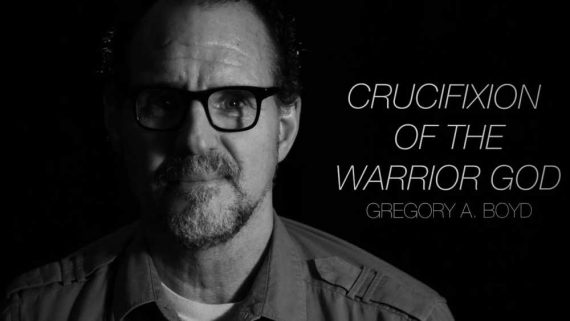 Greg Boyd has a new book out. Actually, it’s two books. The two-volume work is titled The Crucifixion of the Warrior God.. I have been waiting for these books for about four years now … His book attempts to provide an explanation for the violence of God in Scripture.
Greg Boyd has a new book out. Actually, it’s two books. The two-volume work is titled The Crucifixion of the Warrior God.. I have been waiting for these books for about four years now … His book attempts to provide an explanation for the violence of God in Scripture.
Back in 2013, I joked that Greg Boyd stole my book, but then about a year later, as I heard more about his book project, I realized that Greg Boyd and I were not quite saying the same thing after all …
But I wasn’t sure exactly what he would say in the book, since it hadn’t yet been published. But now it has been published, and … and it turns out that while I agree with him on about 90% of what he writes in the book, I disagree with him on the central point.
What is his central point? It seems to be this (SPOILER ALERT!): Greg Boyd argues that God withdraws from sin so that evil will be destroyed by evil. The violent portions of Scripture are to be understood as the times when God withdrew from sinful humanity and a sinful world.
Greg Boyd calls this the Principle of Redemptive Withdrawal. He spends most of volume 1 leading up to this point, and most of volume 2 unpacking and defending it.
As with everything Greg Boyd writes, these two books are well-written, well-argued, and thought-provoking. And regardless of what you believe about the violence of God in Scripture, these books will present you with a new way of looking at things so that you no longer have to choose between accepting that God is violent or writing off the Bible as hopelessly full of error. There are other explanations.
Greg Boyd has presented one such explanation. And there is so much to praise about these books.
That which is Praiseworthy
I love the Greg has stuck with a high view of Scripture and biblical infallibility (which is related to, but distinct from, inerrancy). In the reviews I have read so far, Greg takes a lot of flak for this stance, but I am completely on board with him. When people give up on the inspiration and infallibility of Scripture, I find that they rarely wrestle with the text. Instead, they too quickly write off the uncomfortable passages as being “hopelessly in error.” I am convinced that one reason Greg Boyd is a leading theologian is that his view of Scripture forces him to wrestle night and day with the troublesome texts. Such an approach leads to creative thinking and approaches to biblical hermeneutics, rather than simply consigning something to the trash bin of “error.”
Another major point from Greg Boyd’s excellent book is his insistence on the truth that Jesus reveals God to us… and especially through His crucifixion. Greg Boyd calls this the cruciform (or crucicentric) hermeneutic. I have referred to this elsewhere as reading the Bible with a crucivision lens. This approach to Scripture and theology is essential.
Third, I 100% agree with Greg Boyd that sin bears its own punishment, so that when sin comes to fruition in our life, it brings forth only death and destruction.
I could go on and on about the many areas of complete agreement I have with Greg Boyd and this book.

My One Main Sticking Point … or Maybe Two
Ultimately, while I agree with so much of Boyd’s approach to the problem of divine violence, I believe it misses the mark in two main areas.
First, I was consistently uncomfortable with Boyd’s understanding of sin. Since sin is “the problem” in Scripture, it seems he should have spent more time discussing the origin and nature of sin. For example, Boyd wrote in numerous places that Jesus bore the destructive consequences of sin “that we deserved” (cf. e.g., 768). I’m not certain, but Boyd seems to view sin as creating a sort of debit in the divine ledger books, which ultimately got charged to Jesus. I think this transactional way of viewing sin led Boyd astray.
Yes, there are destructive consequences of sin, but I am not sure that there are destructive consequences of sin “that we deserve.” That’s like saying that “Jesus came to deliver slaves from the chains that they deserve.” This means something else entirely than saying “Jesus came to deliver slaves from the chains.”
Much more needs to be said on this point, but I’m trying to keep this review relatively short.
So the second main point of disagreement I have with Boyd is in his central thesis that God withdraws from sin to let it have its way with us. I already briefly mentioned this above, but I find this view so disheartening and discouraging. I 100% agree with Boyd that all of Scripture and all of God’s character and activity in human history must be viewed through Jesus Christ, and especially Jesus Christ on the cross. But Boyd’s main thesis for God’s withdrawal comes from Jesus’ statement on the cross “My God, My God, why have you forsaken me?” (Matt 27:46-47).
And though I read and re-read Boyd’s explanation of this cry from the cross (pp. 768-780), I never really understood how Greg understood this text. Here is his basic conclusion:
Perhaps the best way of thinking about this is to distinguish between the loving unity that the three divine Persons experience, on the one hand, and the loving unity that defines God’s eternal essence, on the other. We could say that on the cross, the former was momentarily sacrificed as an expression of the latter. …
… While the Principle of Redemptive Withdrawal is focused on the abandonment Jesus experienced as he experienced the Father’s judgment on the sin of the world, it is nevertheless grounded in the truth that the cross is the definitive expression of the self-giving, mutual indwelling agape-love that defines the triune God throughout eternity (p. 778).
It sounds like Greg is saying something similar to how I understand this passage (Here is my explanation of Matthew 27:46-47), but I am not sure. I don’t know what he means by “the Father’s judgment on the sin of the world,” and I don’t find his distinction between the divine experience and the eternal essence to be helpful.
But this is the crucial (pun intended) passage for Greg’s thesis. What exactly happened on the cross when Jesus cried out “Why have you forsaken me?” is the most important text for understanding how God responds to sin. Greg seems to believe that God truly did abandon Jesus to sin, and therefore, God also abandons humans to sin when we persist in it.
 Even if Greg is right that God abandoned Jesus to sin (which I do not agree with), wouldn’t it be better to say that God abandoned Jesus to sin so that God did not have to abandon us to sin?
Even if Greg is right that God abandoned Jesus to sin (which I do not agree with), wouldn’t it be better to say that God abandoned Jesus to sin so that God did not have to abandon us to sin?
In my view, it is best to say that God never abandons anyone. Not Jesus and not us. “Something else is going on” when Jesus cries out from the cross, “My God, My God, Why have you forsaken me?”
The flood event in Genesis 6-8 is one example of how Greg Boyd deals with the violent texts of Scripture. He says that since wickedness had spread over the face of the earth, all humanity had become corrupted by the sons of God (Gen 6:1-8), and so Noah was literally the last pure man on earth, and so to save, rescue, and deliver humanity from complete destruction, God had to step back from humanity and withdraw His protection so that sin would destroy humanity and a new creation could occur through Noah and his family, whom God rescued and delivered from the flood through the ark. Boyd argues that God’s only activity in the flood was to rescue and deliver Noah. The flood waters came on their own as God stepped back.
I am extremely uncomfortable with such an explanation of the flood account, or such a way of reading Scripture. My discomfort is not because Boyd’s thesis is new, but because I think it ultimately violates one of his preliminary points, that all of Scripture must be read and interpreted through Jesus Christ, and especially through Jesus Christ on the cross. I do not believe that what we see on the cross is God withdrawing from sin, but rather jumping head-first into it.
God Does Not Withdraw from Sin. He Dives Into It
Since Jesus reveals to us what God is really like, and since Jesus is the incarnation of God, then Jesus also reveals how God deals with sin.
God does not back away from sin to let it have its way. No, God, in Jesus, enters fully into our sin, not to participate in it, but to deliver us from it. He does not draw away; He dives headlong into the mess.
I do not believe that God allows sin to have its way with us, even if we continue to rebel and live in it. This is little more than another form of child abuse. A neglectful, absentee parent is barely better than an abusive one.
I do not believe that God destroys sin by letting sin destroy itself. I believe that God destroys sin through redemption. He destroys sin by tearing it apart from the inside, not violently, but through love, grace, mercy, forgiveness, and revelation. I believe God destroys sin through the revelation and illumination brought by the incarnation. He rescues, not be retreating, but by redeeming. Jesus said “I will never leave you, nor forsake you.” And neither does God. He never withdraws. Never backs away. Never leaves us alone.
Does sin hurt us? Yes. Does sin bear its own punishment? Yes. God does not punish us for sin. But the blows we feel as a result of our own sin are the glancing blows that hit His back first.
This is starting to turn into a book of my own, so I will stop here. Look, read this book. Absolutely read this book. Even though I disagree with the central point of the book, it does a fantastic job of presenting some truths that all Christians need to hear.
But if you are uncomfortable with Greg’s point that God withdraws from sin to let it have its way, that’s okay … be uncomfortable .. for there are other ways to maintain Boyd’s cruciform hermeneutic without turning God into an absentee parent when we need Him most. You can get your copy on Amazon here.
… Of course, if you want my own take on the subject of how to understand the violence of God in the Bible, my explanation is found in my recently-published book, Nothing but the Blood of Jesus.




Currently reading book 1. Do your books Atonement of God and Nothing but the Blood lay out your full views on this issue?
Hm, sort of. Not my views on Scripture, though.
Will you be elaborating in a post by any chance?
No, probably not. I mean, there is a post on my website which goes along with this FB post, but nothing beyond that…. At least, not right now.
Nice review, Jeremy. I agree with your assessment of the cross as the ultimate expression of God diving into sin in solidarity with humankind, not withdrawing from it.
If I may be permitted one quibble, it would be with this:
“When people give up on the inspiration and infallibility of Scripture, I find that they rarely wrestle with the text. Instead, they too quickly write off the uncomfortable passages as being “hopelessly in error.””
This seems to me to be rather caricatured.
First, I no longer believe in infallibility, and I believe in a very ‘light’ form of inspiration. But that is not because I’ve “given up” on anything; it’s because, after careful reading and thought, I’ve come to a different set of reasoned conclusions about the nature of scripture.
Second, I find that, having adjusted my understanding of the nature of scripture, if anything I wrestle with it more seriously, not less. I take it more seriously, not less.
And third, when I conclude that a biblical writer got something wrong about God, I do not “write off” the text as being “hopelessly in error”; rather, I understand that the writer was doing what writers at that time and place did, from within the cultural constraints by which he was bound. Again, this does not allow me to dismiss the text as valueless; it simply allows me to understand it from a different perspective.
Thanks, Rob.
You are right. It was a caricature. I should have been more careful with my words. I value and respect the views of people like yourself, and numerous others, who hold to the various “Less than inerrant” views about Scripture. I suppose that many inerrantists might accuse me of something similar, though I don’t view myself that way.
Anyway, thanks for providing the clarification.
Thanks, Jeremy. I appreciate your response.
Sorry Jeremy, somehow I saw your post but never saw the link attached to it…
I really like your post Jeremy it confirms a lot of my journey over the past 5 years. I believe God is not angry with us and from what I understand he does not withdraw from us because of sin. That notion conflicts with the fact we have the Holy Spirt dwelling within us despite our sin….ie within our imperfect bodies. Yet scripture tells us our bodies are the temple of the HS despite its imperfections and our wrong doing. Sin bears/produces its own consequences for us and those around us and the rest of the world. I have no doubt that God loves us the way we are…. but loves us to much to leave us the way we are. Jesus dealt with the slavery of sin on the cross thus we are free to choose to do or not do. My experience from helping people struggling with life and misery bears out what you described when you said “He destroys sin by tearing it apart from the inside, not violently, but through love, grace, mercy, forgiveness, and revelation. I believe God destroys sin through the revelation and illumination brought by the incarnation.” So true when people embrace Christ. The Lens of Christ certainly does produce revelation.
I love Greg and I am looking forward ton reading these books. Although I do not understand Matthew 27:46-47 as actual momentary abandonment. If his thesis is built around his interpretation of that verse then it is going to be difficult to sell the idea unless he makes a convincing argument against John 16:32 and Psalm 22, for me at least.
I am a bit confused about the Principle of Redemptive Withdrawal, it sounds similar to me as to how you explained Gods wrath in the appendix of the Atonement of God. Is there a clear distinction that you could perhaps help clarify things for me?
Jeremy, I agree 100% with what you said : He destroys sin by tearing it apart from the inside, not violently, but through love, grace, mercy, forgiveness, and revelation. This is so spot on to the very nature of our God who is love. God is love. I also believe that He never leaves us alone. That is my experience with the Lord.
Thanks for this Jeremy.
I agree with Wesley that John 16.31-33 (and other passages that make clear what Jesus believed to be the meaning of his Cross) and the Ps 22 connection are critical. I don’t see how it’s even possible to construe Jesus’ cry as a (temporary) fragmenting of his mind and beliefs. But Greg has recently conceded that it’s possible to follow his line of thought all the way while holding that Jesus enjoyed a deep self-contentment that did *not* fall victim to any feeling of abandonment, a very curious thing to concede given CWG. However, though he grants this is possible, his analogies and other statements suggest he doesn’t himself think Jesus was in possession of any transcendent self-contentment. CWG definitely rests on the case that Jesus’ mind is temporarily blown – as it were.
There’s a lot to like about aspects of Greg’s work, but there are deep problems at its core. It will be interesting to see further reviews that come out.
Tom